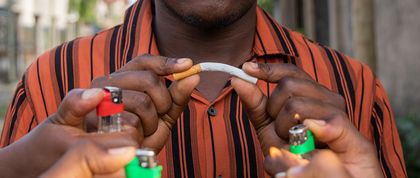
Every time we get close to passing legislation to ban menthol cigarettes, politicians get spooked; this time it was President Biden. In April his office announced they are indefinitely delaying a long-awaited menthol cigarette ban. In an election year it is reasonable to surmise that the rationale for this change in policy is the administration’s concern about a backlash from Black voters, who represent a disproportionate number of people who smoke menthol cigarettes.
At least, that’s what the tobacco industry is telling the President. However, a poll released by the Campaign for Tobacco-Free Kids found that voters support the rule by a wide margin, with even stronger support from Black voters. That makes sense, given that tobacco use is a major contributor to three of the leading causes of death among Black Americans: heart disease, cancer and stroke. Black Americans die from these conditions at far higher rates than other Americans, and 80 percent currently using cigarettes smoke menthol ones.
As we approach the 15-year mark since President Obama signed the Family Smoking Prevention and Tobacco Control Act, it is especially disturbing to see the Biden administration continue to promote the false claims of the tobacco industry about support from the civil rights community. In response to the decision, the costs of the delay were outlined by Yolonda C. Richardson, President and CEO of the Campaign for Tobacco-Free Kids and by Derrick Johan, President and CEO of the NAACP. They said, “Delays cost lives, especially Black lives. Delays allow the tobacco industry to continue its predatory targeting of Black and other communities with menthol cigarettes…. If Black lives truly matter, it’s time to get rid of menthol cigarettes, the only flavored cigarettes still on the market.”
Although the industry has been losing battles against flavor bans nationally, it continues to find success in preventing a ban of menthol cigarettes. Time and again, government leaders have decided to delay a menthol ban due to the success of tobacco industry tactics to protect the valuable menthol market. Data should drive public health policy. There is more than enough data to support menthol bans; what we need is the political will.

Donna Shelley, MD, MPH
Vice Dean for Research; Professor of Public Health Policy and Management; Director, NYC Treats Tobacco; Co-Director, Global Center for Implementation Science